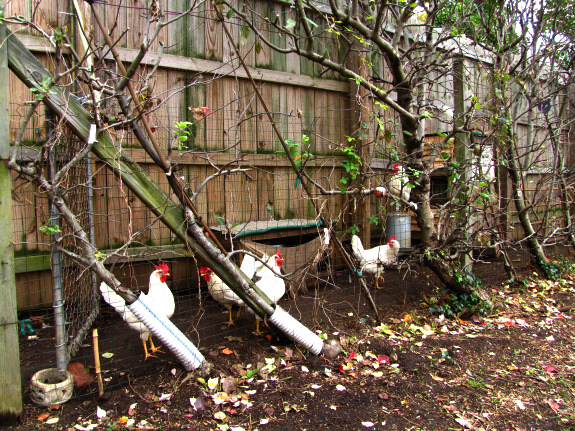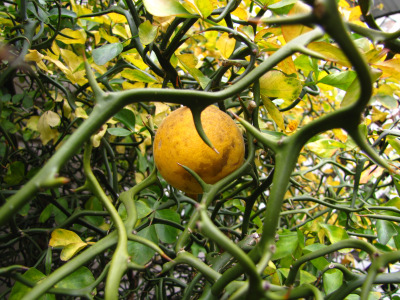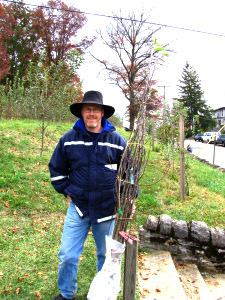
Urban homestead permaculture

 Even
though he had customers to the Urban
Homestead showing up
right and left, Tim Hensley was kind enough to take a few minutes out
of his Saturday afternoon to give me a quick tour of his
backyard. There, I learned answers to three pressing questions
that I've been pondering for a while.
Even
though he had customers to the Urban
Homestead showing up
right and left, Tim Hensley was kind enough to take a few minutes out
of his Saturday afternoon to give me a quick tour of his
backyard. There, I learned answers to three pressing questions
that I've been pondering for a while.
How
do you keep enough adult apple trees on hand to provide scionwood for
100 heirloom varieties in a tiny city lot? Tim espaliers many of his apple trees so
that they can fit in a small space, then he adds a permaculture twist,
running his chickens under the espaliered trees to prevent populations
of bad bugs from building up. In addition to planting these
espaliered trees just a couple of feet apart, he has a few rows of
adult trees in his nursery planted five or six feet apart.
Clearly, close spacing is okay if you're growing the trees for
scionwood (or, presumably, as a test orchard.)
 I've read that the triofliate
orange is a species of citrus that is hardy enough to fruit in zone 6,
but I've heard varying reports on its flavor. What do you think? Tim Hensley just
happened to have a Flying Dragon trifoliate orange on the side of his
house. It was loaded with lovely fruits, and I could tell the
mass of thorns would make good hedge material. However, Tim was
less impressed by the flavor. Trifoliate oranges are really only
good enough for making lemonade or marmalade, and Tim said that the
resulting food had a "plasticky" flavor. I guess I'll stop
considering planting a trifoliate orange.
I've read that the triofliate
orange is a species of citrus that is hardy enough to fruit in zone 6,
but I've heard varying reports on its flavor. What do you think? Tim Hensley just
happened to have a Flying Dragon trifoliate orange on the side of his
house. It was loaded with lovely fruits, and I could tell the
mass of thorns would make good hedge material. However, Tim was
less impressed by the flavor. Trifoliate oranges are really only
good enough for making lemonade or marmalade, and Tim said that the
resulting food had a "plasticky" flavor. I guess I'll stop
considering planting a trifoliate orange.

Will
my hardy figs survive the winter and fruit? Tim has two huge and
lovely fig trees growing in his yard. The first --- LSU Purple
--- has never fruited for him and he doesn't recommend it in our
climate. On the other hand, he told me that his Chicago
Hardy fig has never been winter-killed, perhaps because it is
tucked into a beautiful nook surrounded on two sides by his house and
with the dryer exhaust vent coming out nearby. I feel like he
told me he wasn't getting many fruits off of the Chicago Hardy, but all
of the information I was trying to take in is starting to get mushed up
in my head. Maybe Mom can chime in with her memory here....
 Finally,
I enjoyed trading broiler tales with Tim and one of his customers, Brody
from Damascus. Brody told us that he likes to soak his newly
killed chickens in a bath of icy saltwater, which he said hastens the
end of rigor mortis so that he can freeze his chickens nearly right
away and still get tender meat. I'd be curious to hear if anyone
else has had any experience with the saltwater trick.
Finally,
I enjoyed trading broiler tales with Tim and one of his customers, Brody
from Damascus. Brody told us that he likes to soak his newly
killed chickens in a bath of icy saltwater, which he said hastens the
end of rigor mortis so that he can freeze his chickens nearly right
away and still get tender meat. I'd be curious to hear if anyone
else has had any experience with the saltwater trick.
Want more in-depth information? Browse through our books.
Or explore more posts by date or by subject.
About us: Anna Hess and Mark Hamilton spent over a decade living self-sufficiently in the mountains of Virginia before moving north to start over from scratch in the foothills of Ohio. They've experimented with permaculture, no-till gardening, trailersteading, home-based microbusinesses and much more, writing about their adventures in both blogs and books.
Want to be notified when new comments are posted on this page? Click on the RSS button after you add a comment to subscribe to the comment feed, or simply check the box beside "email replies to me" while writing your comment.

I plunge in an ice water bath after gutting to remove the body heat immediately, but also because I'm usually doing more than one bird at a time. After moving into the kitchen and a super cleaning out of the insides, I coat the gut with a handful of kosher salt to pull out the extra blood from the meat for 10-15 minutes and do a cold water rinse. Personally I don't like salt all over my food before cooking. YMMV